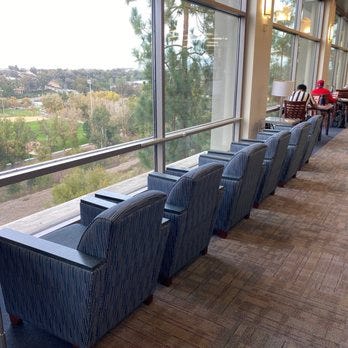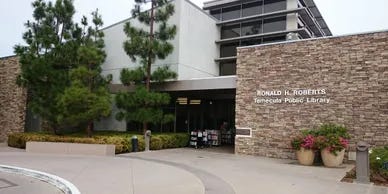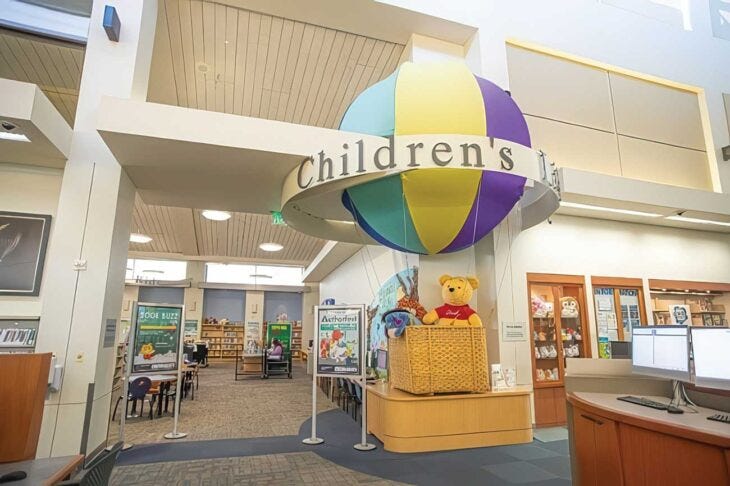In defense of reading books you don’t own
Why the public library should be the first stop, not the afterthought
As I write this, I’m sitting in an armchair in my local library. I just placed a bag-ful of books in the return slot. I have two requested books to pick up, and stacks full of potential new reads.
I also have one last book from my previous haul that I will not have time to finish before it’s due.
Alas. I’ve bookwormed too close to the sun.
“Local Voices, Local Choices”, a fascinating book by the Jane Goodall Institute about the interweaving of conservation and community, is only half finished.
When I talk to other readers, many of them don’t go to the library for this exact reason. They’d rather own books, so there’s no deadline, no restrictions. You can annotate them, re-read them, lose them, let a friend borrow them.
I get it, I do. I like owning books too.
But when readers talk about the library like it’s a second-rate, last resort option, I have to come to its defense. I actually think the public library should be the first stop when you’re getting your next read, not an afterthought.
Owning books vs reading books
Is it book-loving or just retail therapy?
A common topic of conversation amongst book lovers is owning books vs reading books. Sounds like the same thing, right?
Until you have stacks of unread books in your room, a TBR list as long as a CVS receipt, and you’re still itching for your next purchase.
When you buy book after book and never get around to reading them, I’m sorry: you don’t have a reading hobby, you have a book-buying hobby.
As is the case with many hobbies, what we see trending on social media is the aesthetic, not the act.
The hallowed Barnes N Noble trip, one hand on your iced coffee and one on a crisp paperback. The dopamine rush of getting notified when Amazon delivers your new read.
Look up “reading”, “bookworm”, or similar on any social media platform. For the most part, you don’t find discussions of stories or advice on how to build a reading habit or improve your reading comprehension.
Pinterest shows you perfectly posed pictures of the latest “cool girl” reads stacked on squeaky clean desks. Pretty pastel highlighters, annotations in cursive, and, of course, the color-coded shelves.
Yes, there is love for reading in all this. But the trend itself is driven by the compulsion to buy and own, aided by a focus on aesthetic over actual activity.
Companies like Amazon and Barnes N Noble don’t necessarily care if you read what you buy. They just want you to buy and keep buying.
In the midst of all the TBR lists and mood boards, you’re being advertised to. And it’s not reading books that they’re advertising. It’s always, always about purchasing the product.
The public library exists in sharp contrast to that. The point is to read and learn and study and share. You don’t get to own; it’s not an option.
Is a book worth less to you because you don’t own it?
I’d argue that my reading habit is at its healthiest and most voracious when my library habit is. Checking books out gives me a limited amount of time to finish them, thus forcing me to get to it. The trip to return my books gives me the opportunity to check out more, so it becomes a self-sustaining habit.
I love Barnes N Noble. It’s a treat to get my cafe drink, browse the shelves, pick out a new novel or CD.
That said, the two books I bought at my last visit are still waiting to be read. The eight books I checked out from the library have mostly been finished (seven out of eight ain’t bad).
Support your local library
And it will support you
The Ronald H. Roberts library is one of my favorite places in my hometown of Temecula.
The building itself is beautiful. Not to be that person, but they really don’t design buildings like they used to. With vaulted ceilings, a shaded sidewalk with wisteria boughs, and a wall of windows overlooking the valley, it’s nice to look at and nice to be in.
This is the library I grew up going to. Where I did summer reading programs. Where I got my library card so long ago it still features my first shaky attempt at a signature.
It’s also one of the first places I applied to work after graduating high school. The job search was grueling—I managed to secure interviews at only three of the dozen places I applied to.
One of them was the library. They were never gonna hire me: fresh out of high school and enthusiastic, but unqualified, I was far from the best candidate. But I did have a lovely conversation with the two senior librarians who interviewed me.
They told me that the Ronald H. Robert’s library was actually the most used and frequented of all the libraries in Riverside county. Which was surprising.
It’s busy sure, but never crowded. If this is the most frequented library in the county, the other ones must be ghost towns.
It’s busy for a library. Which is a good thing for the library itself.
Libraries that get more traffic get more funding. More funding means more books, more resources, and more programs.
When you utilize your public library, everything goes right back into your community. At no cost to you.
Why is it so important to support public libraries? Especially if so many people would rather just buy books.
For one thing, libraries are more than just places to get books. Besides books, libraries can offer all sorts of media, like CDs, magazines, DVDs, and local records.
Some libraries offer some really unexpected things, like musical instruments and tools.
It’s also a place for people to study, write, use the internet, and gather without any expectation to spend money. Anyone who doesn’t otherwise have access can use library computers for job applications—this free access could literally turn someone’s life around.
Many libraries have summer reading programs for kids, like the one I used to partake in. There’s also story-times where kids can experience being read to at no cost to their parents. Many libraries host classes, ballot drop-offs, and more.
In a sense, the possibilities are endless. The more traffic a library gets, the more funding they’re allotted, and you can bet that funding will be used to offer more programs and resources that directly benefit your community.
A loving critique for my fellow readers
Don’t take this the wrong way, readers. I love buying and owning books too. I love Barnes N Noble. I’m over the moon that an independent bookshop just opened in my town.
But even I buy new books too often.
I impulse purchased a novel from Target last year, thanks to that cursed 20% off sticker. I won’t name names, but I hated that book. There are books I love and books I didn’t care too much for. I rarely hate a book, but I couldn’t bring myself to finish this one.
If I’d just gotten it from the library instead, I could’ve found that out without spending any money. No harm, no foul.
Meanwhile, some of my favorite books were found first on library shelves. Many of my favorite purchases were books I’d already read. I wanted to own them because they were that good—they deserved re-reading.
A library habit is a reading habit because it forces you to actually read your books before you have to give them back.
I’m not saying you shouldn’t buy books. I’m just saying that maybe we should all be more intentional about how, when, and where we buy them.
At its heart, the habit of buying more books than you can read is just another way overconsumption pops up in our lives.
Checking out more books than you can read, on the contrary, actually helps your local library.
Booktok, book-stagram, and similar social media trends are all good things. It’s good that reading has a foothold in public discussion, that it’s seen as cool and fun. Especially while literacy rates in America are concerningly low.
However, so much of the conversation is centered around the purchasing and owning of books. Books as an aesthetic product are glorified, instead of what reading does for us.
Make an effort to visit your local library more often. Go online and request a book if the physical location doesn’t have what you want.
Focus on reading books you don’t own, rather than owning books you don’t read. You’ll find your reading habit, wallet, and local community will all thank you.








One of the things I like to do at libraries is to take books on “trial runs”. When I come across a title, I want to read, I borrow the book from the library, start reading it, to see my interest in it. If it’s a title I really enjoy or good enough to become part of my own collection, I then go online and buy it. If it’s not interesting, possibly finish it and return it. No harm done, or money spent unnecessary.
I love going to the book store and taking pictures of books, then getting them via libby. i only buy field guides that i can take with me for my job, and books that i really really love. it’s so much easier to read on my kindle than a paper book, and much less expensive too